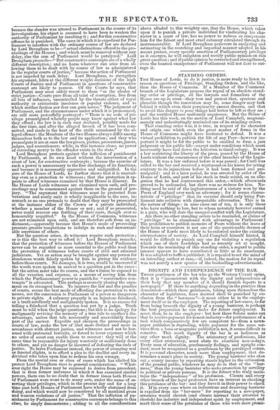STANDING ORDERS.
THE House of Lords, to do it justice, is more ready to listen to reason on questions of Privilege, Standing Orders, and the like, than the House of Commons. If a Member of the Commons branch of the. Legislature propose the repeal of an obsolete stand- ing order or privilege, all the lawyers and formalists of the House are up in arms—they vow and protest that, specious and plausible though the innovation may be, some danger may lurk behind it which even their perspicacity cannot discern, and that to avoid this danger in posse things had better be left as they are : and the terrified House uniformly acquiesces. But the House of Lords has this week, on the motion of Lord Campbell, magnani- mously and unhesitatingly rescinded one of its standing orders. That standing order was, it is true, in respect of its character and origin one which even the great master of forms in the House of Commons might have hesitated to defend. It was a virtual prohibition to publish the life of any Peer—however im- portant it might be for the public to be enabled to form a just judgment on his public life—except under conditions which must necessarily. have tied down the historian to timid eulogy. It was a law restricting the liberty of the press, passed by the House of Lords without the concurrence of the other branches of the Legis- lature. It was a law enforced before it was passed ; for Curll was called to the bar and received a reprimand on his knees for acting contrary, to its injunctions before it had been formed and pro- mulgated : and at a later period, he was arrested by order of the House of Lords, and part of his stock in trade seized, on an alle- gation that he had contravened this order,—which afterwards proved to be unfounded, but there was no redress for him. No- thing need be said of the ingloriousness of a victory won by the Peers of England over such an adversary; for it seems charac- teristic of " privilege " that its exercise should only bring Par- liament into collision with disreputable adversaries. This is in the nature of things : in nine cases out of ten, it is only those who have nothing to lose but to whom notoriety however earned is a gain who will dare the unequal conflict with the Legislature. Are there no other standing orders to be rescinded, or claims of " privilege " to be abandoned with advantage to Parliament ? The prohibition to publish memoirs of Peers without the leave of their heirs or executors is not one of the questionable decrees of the House of Lords most likely to be enforced under the existing circumstances of society. As Lord Campbell himself hinted, it would be difficult to punish any one for violating a regulation which one of their Lordships had so recently set at nought. Towards the rescinding of this standing order, a regard to public interest appears to have contributed as little as its enactment. It was adopted to baffle a publisher: it is repealed to set the mind of an intending author at ease,—if, indeed, the motion for its repeal was not merely a new species of the bookselling-advertisement.


























 Previous page
Previous page